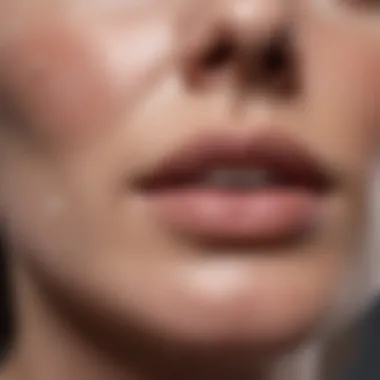Combat Ingrown Neck Hairs: Effective Tips and Techniques


Beauty Tips and Tricks
Skincare Routine Tips
- Start with a sulfate-free cleanser to prevent stripping natural oils.
- Use a gentle exfoliator with salicylic acid to unclog pores.
- Moisturize daily with a non-comedogenic lotion to keep the skin hydrated.
- Apply sunscreen to shield the neck from harmful UV rays.
Investing in quality skincare products is crucial to maintaining a healthy neck area and minimizing the risk of ingrown hairs. Look for ingredients like chamomile and aloe vera known for their soothing properties.
Opting for natural and soothing ingredients can significantly reduce irritation and redness, promoting healthier skin overall.
Haircare Hacks
Proper haircare also plays a key role in preventing ingrown hairs. Keep neck hair well-moisturized and conditioned to prevent it from curling back into the skin. Trim the hair regularly to avoid ingrown hair formation.
Product Reviews
For effective neck haircare, consider investing in products specifically designed to soothe and prevent ingrown hairs. Look for exfoliating scrubs with gentle beads to prevent irritation and maintain a smooth neck texture.
Skincare Product Reviews
- Product A: A gentle exfoliating scrub with natural botanicals.
- Product B: A calming serum to reduce inflammation and redness.
Makeup Trends
While makeup may not directly prevent ingrown hairs, it's essential to choose products that won't further irritate the skin. Opt for lightweight, non-comedogenic makeup to prevent pore-clogging and potential ingrown hair development. Avoid heavy, greasy products that can exacerbate skin issues.
Expert Beauty Advice
Consulting with skincare specialists or dermatologists can provide invaluable insights into preventing ingrown hairs on the neck. They can recommend specific treatments and products tailored to your skin type and address any underlying issues that may contribute to ingrown hair formation.
Skincare Specialist Recommendations
- Regular exfoliation is key to preventing ingrown hairs on the neck.
- Use a retinol-based cream at night to promote skin cell turnover.
For long-lasting results, consider professional treatments like chemical peels or laser hair removal under expert guidance.
Beauty Industry News
Stay updated on the latest product launches and innovations in the beauty industry, keeping an eye out for new solutions targeted at ingrown hair prevention. Explore beauty events to gain insights from industry experts and discover cutting-edge treatments to combat ingrown hairs effectively.
Beauty Event Coverage


- Industry experts showcased new ingrown hair prevention techniques at the Beauty Expo.
- Renowned dermatologists shared tips on maintaining a healthy neck area and preventing ingrown hairs at the Skincare Summit.
Effective Ways to Reduce the Occurrence of Ingrown Hairs on the Neck
Understanding Ingrown Hairs
To fully comprehend the inconvenience and discomfort that ingrown neck hairs can cause, one must explore the root causes of this issue. Ingrown hairs result from various factors, including curly hair structures, improper shaving techniques, and clogged hair follicles. Grasping the underlying reasons behind ingrown hairs is crucial in devising an effective prevention strategy. Not only does it aid in identifying symptoms early on, but it also guides individuals in adopting suitable preventive measures.
Causes of Ingrown Hairs
-#### Curly Hair Structure Curly hair poses a unique challenge in the realm of ingrown hairs. Its characteristic tight coils can often lead to hair regrowth beneath the skin's surface, increasing the likelihood of ingrown hairs. While curly hair enhances one's aesthetic appeal, its structure requires special attention during grooming routines to prevent ingrown hairs.
-#### Improper Shaving Techniques Utilizing improper shaving techniques significantly contributes to the development of ingrown neck hairs. Practices such as shaving against the hair growth direction or using dull razors can result in hair shafts bending back into the skin, triggering ingrown hairs. Understanding the impact of proper shaving methods is paramount in maintaining smooth and bump-free skin.
-#### Clogged Hair Follicles Clogged hair follicles play a pivotal role in the formation of ingrown hairs. When dead skin cells and debris accumulate around hair follicles, it impedes hair growth, causing it to curl back into the skin instead. Recognizing the significance of keeping hair follicles clean and unclogged is essential for combating ingrown hairs effectively.
Symptoms of Ingrown Hairs
-#### Red Bumps One of the prevalent symptoms of ingrown neck hairs is the emergence of red bumps on the skin's surface. These bumps indicate trapped hair beneath the skin, leading to inflammation and sensitivity. Monitoring and addressing red bumps promptly can prevent further complications and discomfort.
-#### Itching and Irritation Persistent itching and irritation in the neck area signify the presence of ingrown hairs. The discomfort experienced is often a result of hair growing sideways or curling back into the skin, triggering a reaction. Proper care and soothing remedies are essential to alleviate itching and prevent skin damage.
-#### Pain or Tenderness Ingrown hairs can cause localized pain and tenderness, making neck grooming a painful experience. The presence of ingrown hairs beneath the skin's surface can lead to soreness and sensitivity. Implementing gentle skincare practices and targeted treatments can alleviate pain and promote skin healing.
Preventive Measures
In the realm of grooming, preventive measures stand as the frontline defense against the pesky inconvenience of ingrown hairs on the neck. These measures act as a shield, aiming to thwart the emergence of those unwelcome red bumps and irritation. By incorporating meticulous attention to detail in shaving techniques and a dedicated skincare routine, individuals can significantly reduce the likelihood of ingrown hairs making an unwanted appearance.
Proper Shaving Techniques
Use sharp, clean razors
When it comes to shaving, the blade is the unsung hero. Utilizing sharp, clean razors ensures a crisp and precise cut, reducing the chances of hair getting trapped beneath the skin's surface. The keen blade effortlessly glides through the hair, promoting a smooth shaving experience and decreasing the risk of ingrown hairs.
A dull blade spells trouble - opt for sharpness to safeguard your skin.
Shave in the direction of hair growth
Synchronized shaving with hair growth minimizes the potential for hairs to curl back into the skin. By following the natural grain of hair growth, the blade encounters less resistance, ultimately diminishing the likelihood of hairs becoming ingrown.
Avoid repeated passes over the same area
Repetitive strokes over one spot may seem thorough, but they actually elevate the risk of hair irritation and subsequent ingrowns. Limiting the number of passes reduces skin trauma and the chance of wayward hair regrowth.


Exfoliation
Regular exfoliation to prevent buildup
Incorporating regular exfoliation into the skincare routine clears away dead skin cells that could obstruct hair follicles. By maintaining a clear pathway for hairs to grow unimpeded, exfoliation discourages ingrown hairs from taking root.
Gentle exfoliating products recommended
Opt for gentle exfoliating products that respect the skin's delicate balance. Harsh exfoliants can exacerbate skin irritation, possibly leading to ingrown hairs. Choose products with mild exfoliating agents to achieve a polished complexion without disrupting the skin barrier.
Avoid harsh scrubbing
While exfoliation is beneficial, remember that harsh scrubbing can do more harm than good. Gentle motions during exfoliation prevent unnecessary skin trauma, safeguarding against potential irritation and ingrown hairs.
Moisturization
Use non-comedogenic moisturizers
Selecting non-comedogenic moisturizers ensures that the skin receives adequate hydration without clogging the pores. By opting for these lightweight formulations, individuals strike a balance between nourishment and preventing ingrown hairs.
Apply after shaving and exfoliation
Timing matters - applying moisturizer post-shave and exfoliation locks in moisture and soothes the skin. Moisturization further aids in maintaining skin health, diminishing the likelihood of ingrown hairs.
Maintain skin hydration
Hydrated skin is less prone to inflammation and irritation. Consistent moisturization not only promotes skin health but also plays a pivotal role in preventing the onset of ingrown hairs.
This article focuses on valuable tips and techniques to help readers combat ingrown neck hairs effectively. From proper shaving practices to skincare routines, the content offers a comprehensive guide to prevent and manage ingrown hairs on the neck.
Treatment Options
In the realm of preventing and managing ingrown hairs on the neck, exploring treatment options becomes pivotal. Effective solutions can significantly impact the skin's condition and overall well-being. Through a careful selection of treatments, individuals can address ingrown hairs proactively, nurturing healthier skin.
Topical Solutions
Salicylic Acid or Glycolic Acid Creams
Salicylic acid and glycolic acid creams stand out as essential tools in combating ingrown hairs. These creams play a crucial role in exfoliation, helping to unclog pores and prevent hair follicle blockages. Their gentle yet effective nature makes them ideal choices for addressing ingrown hairs at the root.
Tea Tree Oil for Its Antibacterial Properties
Tea tree oil emerges as a powerful ally in the fight against ingrown hairs, thanks to its notable antibacterial properties. This natural extract aids in soothing irritation and reducing inflammation, promoting a healthier skin environment to deter ingrown hairs.


Aloe Vera Gel for Soothing Effects
Aloe vera gel's soothing properties make it a go-to solution for alleviating discomfort associated with ingrown hairs. Its calming effect helps reduce redness and irritation, offering relief and promoting skin healing.
Professional Interventions
Consultation with a Dermatologist
Engaging in a consultation with a dermatologist holds immense value in addressing persistent ingrown hairs. Dermatologists can provide tailored insights and recommendations based on individual skin needs, guiding the path towards effective treatment and prevention.
In-Office Treatments like Chemical Peels
In-office treatments like chemical peels present targeted solutions for combating ingrown hairs. Chemical peels help to exfoliate the skin deeply, removing dead cells and promoting cell turnover to prevent hair entrapment and reduce the occurrence of ingrown hairs.
Laser Hair Removal for Long-Term Results
For individuals seeking lasting relief from ingrown hairs, laser hair removal stands out as a transformative option. This advanced treatment targets hair follicles, decreasing hair growth and minimizing the likelihood of ingrown hairs over time.
Maintaining a Healthy Skincare Routine
Maintaining a Healthy Skincare Routine holds paramount importance in this article, as it serves as the cornerstone of preventing and managing ingrown hairs on the neck effectively. This comprehensive guide aims to equip readers with the necessary knowledge and practices to uphold skin health and combat ingrown hairs. A meticulous skincare routine not only promotes skin vitality but also aids in preventing various skin concerns, including ingrown hairs. By focusing on key elements such as regular skin assessment, consistent self-care practices, and seeking professional advice when needed, individuals can establish a robust foundation for healthy skin.
Regular Skin Assessment
Monitor skin condition for changes
Rigorously monitoring the skin for changes constitutes a fundamental pillar of maintaining a healthy skincare routine. Regular scrutiny enables individuals to detect any deviations from the norm promptly. By keeping a keen eye on variations in skin texture, color, or the emergence of new bumps, individuals can take proactive measures to address potential issues before they escalate. This proactive approach not only aids in the early identification of ingrown hairs but also facilitates timely intervention to prevent their occurrence.
Adjust skincare regimen as needed
Flexibility in adjusting the skincare regimen as per the skin's requirements plays a pivotal role in promoting skin health. Skin conditions can fluctuate due to various internal and external factors, necessitating tailored adjustments to the skincare routine. By assessing the skin's responses to different products and environmental influences, individuals can refine their skincare regimen to optimize efficacy and address specific concerns. This adaptability ensures that the skincare routine remains effective in combating ingrown hairs and maintaining overall skin well-being.
Seek professional advice when necessary
Incorporating professional guidance into skincare practices is imperative for comprehensive skin care. Seeking advice from dermatologists or skincare experts can provide valuable insights into effective ingrown hair prevention strategies and overall skin health. Professional assessments can help individuals identify underlying skin issues, receive personalized recommendations, and access advanced treatments when required. Consulting experts ensures that individuals receive expert opinions and specialized care tailored to their unique skin needs.
Consistent Self-Care Practices
Stay hydrated for overall skin health
Maintaining adequate hydration levels is a cornerstone of promoting overall skin health. Proper hydration supports skin elasticity, aids in toxin removal, and enhances the skin's natural barrier function. By ensuring optimal hydration levels, individuals can strengthen their skin's resilience against ingrown hairs and other skin concerns.
Eat a balanced diet rich in nutrients
Consuming a balanced diet replete with essential nutrients is instrumental in supporting skin health. Key nutrients like vitamins A, C, and E, as well as omega-3 fatty acids, contribute to skin rejuvenation and protection. A nutrient-rich diet fosters skin vitality, reduces inflammation, and supports the body's natural healing processes. By prioritizing nutrient-dense foods, individuals can fortify their skin against ingrown hairs and maintain a luminous complexion.
Practice stress-relief techniques
Implementing stress-relief techniques is crucial for skin health and overall well-being. Chronic stress can exacerbate skin conditions and compromise skin immunity, making individuals more susceptible to ingrown hairs. Engaging in relaxation practices, such as meditation, yoga, or deep breathing exercises, can help alleviate stress levels and promote skin rejuvenation. By incorporating stress-relief techniques into daily routines, individuals can nurture their skin from within and mitigate the risk of ingrown hairs effectively.







